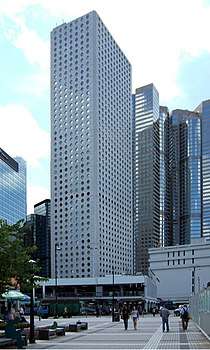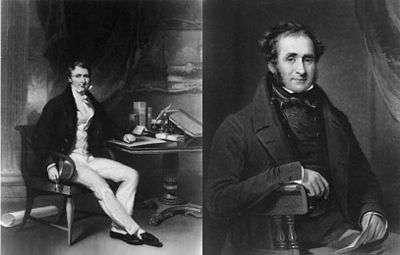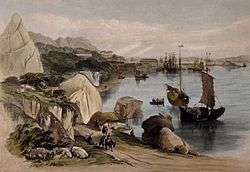Jardine Matheson
 | |
 | |
| Public company | |
| Industry | Conglomerate |
| Founded | 1 July 1832[1] |
| Founder | |
| Headquarters | 48/F Jardine House, Hong Kong |
Area served | Worldwide |
Key people |
|
| Products |
|
| Revenue |
|
| Subsidiaries | |
| Website |
jardines |
| Jardine, Matheson Co Ltd | |||||||||||
| Traditional Chinese | 怡和輪船公司 | ||||||||||
|---|---|---|---|---|---|---|---|---|---|---|---|
| Simplified Chinese | 怡和轮船公司 | ||||||||||
| |||||||||||
Jardine Matheson Holdings Limited (also known as Jardines) is a British conglomerate incorporated in Bermuda, with its primary listing on the London Stock Exchange and secondary listings on the Singapore Exchange and Bermuda Stock Exchange.[3] The majority of its business interests are in Asia, and its subsidiaries include Jardine Pacific, Jardine Motors, Jardine Lloyd Thompson, Hongkong Land, Jardine Strategic Holdings, Dairy Farm, Mandarin Oriental Hotel Group, Jardine Cycle & Carriage and Astra International.[4][5][6] It sponsors the Jardine Scholarship.
Jardines was one of the original Hong Kong trading houses or Hongs that date back to Imperial China, and as of December 2010, 41 percent of the company's profits are still earned in China.[7] The company is controlled by the Keswick family, who are descendants of co-founder William Jardine's older sister, Jean Johnstone.
In 2013, both Jardine Matheson and Jardine Strategic were among the top 200 publicly traded companies in the world, as valued by market capitalization.[8]
History
19th century to WWII: The early days


The firm of Jardine, Matheson & Co. emerged in 1832 from an evolving process of partnership changes in the trading business Cox & Reid, a partnership established in 1782 between John Cox and John Reid, the latter having been agent of the Austrian Empire's Trieste Company.[9]
University of Edinburgh Medical School graduate William Jardine (1784-1843) joined the firm, by then having morphed through Cox & Beale, Beale & Co. and Beale & Magniac into Magniac & Co., and the original partners long gone, in 1825 at the invitation of principal Hollingworth Magniac. University of Edinburgh graduate James Matheson joined three years later as Magniac prepared to retire.[10][9] With the cession of Hong Kong under the 1842 Treaty of Nanking, the firm, by then named Jardine, Matheson & Co., set up its headquarters on the island and grew rapidly. Continuing its longstanding trade in smuggled opium, tea, and cotton, the firm diversified into other areas including insurance, shipping, and railways. By the mid-19th century, the company had become the largest of the hongs or foreign trading conglomerates with offices in all the important Chinese cities as well as Yokohama, Japan. [11][12] One of its branch agencies, Glover and Co., established in Nagasaki, was known in Japan as an arms dealer who contracted with then-rebel forces from Chōshū Domain who led the Meiji Restoration in 1868.
In the early decades of the 20th century, Jardines built cotton mills, a press packing plant, and a brewery in Shanghai while expanding into Africa, America, and Australia. When war came to China in 1937, the firm suffered heavily both in Hong Kong and in mainland China.
After the 1949 foundation of the People's Republic of China, trading conditions for foreign companies under the new Communist regime became increasingly difficult.[13]
Post Second World war restructuring and expansion
In 1961, after the firm's flotation,[14] the landmark Mandarin Hotel opened in Hong Kong in 1963 as the city's first five star hotel.
In 1970, Jardine Fleming, the first merchant bank in Asia, opened for business while a real estate company and sugar plantations in Hawaii and the Philippines were acquired. A Hong Kong building boom in the mid 1970s saw Jardine's buy Gammon Construction, the largest construction and civil engineering group on the island.[15] A presence was re-established on the mainland in 1979 following China's reform and opening up and a year later the firm established the Beijing Air Catering Company Ltd., the first foreign joint venture in the country.[16] During the 1970s Jardines also expanded their insurance interests with acquisitions in the United Kingdom and the United States laying the groundwork for the foundation of Jardine Insurance Brokers.[17]
By 1980, the firm had operations in southern Africa, Australia, China, Great Britain, Hong Kong, Indonesia, Japan, Malaysia, Philippines, Saudi Arabia, Singapore, South Korea, Taiwan, Thailand, as well as the United States, and employed 37,000 people.[14] After redomiciling to Bermuda in 1984 ahead of the 1997 handover of Hong Kong, in 1990 Jardine Matheson Holdings and four other listed group companies arranged primary share listings on the London Stock Exchange in addition to their Hong Kong listings. Other significant developments during this decade included the merging of Jardine Insurance Brokers with Lloyd Thompson to form Jardine Lloyd Thompson, the acquisition of a 16% interest in Singapore blue-chip Cycle & Carriage and Dairy Farm’s purchase of a significant stake in Indonesia's leading supermarket group Hero. Hotel brand Mandarin Oriental also embarked on a strategy to double its available rooms and improve returns.
The first decade of the new millennium saw Jardine Cycle & Carriage acquire an initial 31% stake in Astra International, which has since been increased to just over 50%. Hongkong Land became a Group subsidiary for the first time following a multi-year programme of steady open market purchases while Jardine Pacific raised its interest in Hong Kong Air Cargo Terminals Limited from 25% to 42%.
21st-century operations
Jardines today comprises a group of companies with extensive operations across Asia and, through some of its businesses, the world. The firm's business interests include Jardine Pacific, Jardine Motors, Hongkong Land, Dairy Farm, Mandarin Oriental, Jardine Cycle & Carriage, through which its interest in Astra is held, and Jardine Lloyd Thompson. The Group also has strategic interests in other entities.
Jardine Pacific
Jardine Pacific is a holding company which represents a significant number of the Group's non-listed interests in Asia, principally in engineering and construction, transport services, restaurants and IT services. These include a number of Jardines’ long-standing businesses such as Jardine Engineering Corporation (JEC), Jardine Shipping Services, Jardine Aviation Services, Hong Kong Air Cargo Terminals, Jardine Schindler, Gammon Construction and Jardine Travel Group as well as more contemporary interests that reflect the demands of Asian consumers; among them Pizza Hut restaurants in Hong Kong, Taiwan and Vietnam, KFC franchises in Hong Kong, Macau and Taiwan, and Jardine OneSolution IT services.[18]
Jardine Motors
Jardine Motors is active in the sales and service of motor vehicles in Hong Kong, Macau, mainland China and the United Kingdom.[19] Subsidiary Zung Fu, which has held the Mercedes-Benz luxury vehicle franchise in Hong Kong for over 50 years, has achieved one of the highest market penetrations in the world for the luxury brand and ranks among its top international performers. The group also represents Smart and Hyundai passenger cars in Hong Kong. Zung Fu is expanding its presence across the growing market of Southern China where it is actively developing a network of Mercedes-Benz dealerships.[20] In the United Kingdom, Jardine Motors is one of the country's largest retail dealership groups with a portfolio of specialist franchises that includes Aston Martin, Audi and Volkswagen, Jaguar and Land Rover, Mercedes Benz and Porsche.
Hongkong Land
Hongkong Land is an Asian property investment, management and development group. Established in Hong Kong in 1889 by Sir Paul Chater and William Keswick, the group today has property interests across the region. In Hong Kong, the group owns and manages approximately 5,000,000 square feet (450,000 m2) of prime commercial space in the Central. In Singapore, it is helping to create the city-state's Central Business District with an expanding joint venture portfolio of new developments. In addition to commercial properties, Hongkong Land also develops residential properties in key cities around the region including Hong Kong, mainland China, Macau and Singapore where its subsidiary MCL Land is a significant property developer. Jardine Strategic has a 50% shareholding in Hongkong Land.
Dairy Farm
Dairy Farm traces its origins in Hong Kong back to the 19th century when it was involved in the production of dairy products and ice. Today the company is a leading pan-Asian retailer.[21] The Dairy Farm group's retail operations range from supermarkets, hypermarkets and health and beauty stores to convenience and home furnishings stores, and operate under well-known local brands. It has a significant presence in Hong Kong, Taiwan, Malaysia, Singapore and Indonesia, and a growing presence in mainland China, India and Vietnam. Dairy Farm operates supermarkets under the banners of Wellcome, Jasons, Shop N Save, Cold Storage and Hero; Giant hypermarkets; health and beauty stores under Mannings and Guardian; IKEA furniture stores in Hong Kong, Indonesia and Taiwan; as well as 7-Eleven convenience stores. The group also has a 50% interest in Maxim's, Hong Kong's leading restaurant chain.[22] Jardine Strategic has a 78% shareholding in Dairy Farm. As of 8 March 2012, Dairly Farm owned 70% of the shares of Lucky Group, the largest grocery mall operator in Cambodia.[23]
Jardine Lloyd Thompson
Jardine Lloyd Thompson (JLT) is a leading insurance and reinsurance broker, risk specialist and employee benefits consultant.[24] Jardines has been in the insurance broking business since its earliest days in Canton and JLT, which is quoted on the London Stock Exchange, is one of the largest companies of its kind in the world. The company operates through two key business groups, Risk & Insurance and Employee Benefits. The risk & insurance group provides specialist insurance and reinsurance broking together with risk management services for a wide range of clients, including some of the world's largest corporations. JLT, which has a significant presence in the Asia-Pacific region, owns offices in 35 territories with some 7,600 employees. The employee benefits group is one of the United Kingdom's leading employee benefits providers.
Mandarin Oriental
Mandarin Oriental Hotel Group is an international hotel investment and management company operating deluxe and first class hotels and residences in city and resort destinations around the world.[25] The group's flagship hotel, Mandarin Oriental, Hong Kong, has been recognized as one of the world's leading hotels since shortly after its opening in 1963 along with the equally world-renowned Mandarin Oriental, Bangkok, previously known as The Oriental.[26] Jardine Strategic has a 74% shareholding in Mandarin Oriental.
Jardine Cycle and Carriage
Jardine Cycle & Carriage (JC&C) is an established Singapore-listed company where, as Cycle & Carriage, it has had a presence since 1926.[27] JC&C has an interest of just over 50% in Astra, a listed Indonesian conglomerate[28] and the largest independent automotive group in Southeast Asia, as well as other motor interests in the region. Together with its subsidiaries and associates, Jardine Cycle & Carriage employs some 201,000 people across Indonesia, Malaysia, Singapore and Vietnam. Jardine Cycle & Carriage operates in Singapore and Malaysia under the Cycle & Carriage banner and the group represents some of the world's best-known motoring marques including Mercedes-Benz, Toyota, Honda and Kia. Jardine Strategic has a 72% shareholding in Jardine Cycle & Carriage.
Astra International
Astra is Southeast Asia's largest independent automotive group. Operating predominantly in Indonesia, it is a provider of a full range of automobile and motorcycle products in partnerships with companies which include Toyota, Daihatsu, Isuzu, UD Trucks, Peugeot and BMW for automobiles, and Honda for motorcycles. Astra also has a strong presence in the automotive component sector through its subsidiary PT Astra Otoparts Tbk.[29] In addition, Astra has interests in financial services; heavy equipment and mining; agribusiness; infrastructure and logistics; and information technology. In financial services, Astra's businesses provide financial products and services to support its automotive and heavy equipment sales. The group is also involved in retail banking through a stake in PT Bank Permata Tbk.
Corporate structure
The present Chairman of Jardine Matheson Holdings Ltd. is Sir Henry Keswick, the company's Tai-pan from 1970 (aged 31) to 1975 and the 6th Keswick to be Tai-pan of the company. His brother, Simon, was the company's Tai-pan from 1983 to 1988 and is the 7th Keswick to be Tai-pan. Both brothers are the 4th generation of Keswicks in the company. The 5th generation of Keswicks are also active within the organisation, Ben Keswick, son of Simon, is managing director of Jardine Matheson Group and Adam Keswick, son of Sir Chips Keswick is Deputy managing director. The organizational structure of Jardines has changed almost totally, but the members of the family of Dr William Jardine still have significant influence in the firm.
Directors (as of 2016)
In July 2016, the directors of Jardine Matheson Holdings were:
- Sir Henry Keswick, chairman
- Ben Keswick, managing director
- Adam Keswick, deputy managing director
- Mark Greenberg
- David Hsu
- Simon Keswick
- Dr. Richard Lee
- Jeremy Parr
- Anthony Nightingale
- Y.K. Pang
- John Witt
- Lord Sassoon, Kt
- Percy Weatherall
- Michael Wei Kuo Wu
Company secretary: Neil McNamara
Lord Sassoon, a former UBS Warburg banker who had been a junior minister in the British Treasury since May 2010, joined Jardine Matheson as an executive board member in January 2013. This appointment brought together members of two great Asian trading dynasties, since Jardine Matheson and the Sassoon family were rivals in the 19th century when they competed to open up and grow trade in Hong Kong and China.
Scottish leadership
Until 1936, principles of staff recruitment, told by Keswick, remained Scottish first, Oxbridge second.[30] "With all due deference to the 'east coast of England' [a reference to Cambridge] I do feel that men from north of the border are the most suitable for our routine business... I am very keen on keeping the Scottish entity of the Firm. But I hope I have not conveyed that I have swung against the University man... I merely consider that he must be aided and abettered by the solid, plodding type from Scotland."[31]
Jardines is controlled by the Keswick family, who are direct descendants of William Jardine's sister Jean through the marriage of her daughter to Thomas Keswick, father of William Keswick, an early Tai-pan of the firm. While the leadership of Jardines is Scottish, the firm is international in its dealings. The staff of Jardines (390,000 employees as of March 2014) is predominantly Asian, with senior management levels composed of a mixture of British, Chinese, Indonesians, Europeans, Australians and Americans.
The Keswicks have maintained a relationship with another prominent Scottish family, the Flemings, of which the author Ian Fleming was also a member. From 1970 until 1998, Jardine Matheson operated a pan-Asian investment banking joint venture, Jardine Fleming, with Robert Fleming & Co., a London merchant bank controlled by the Fleming family. In 2000, Jardine Fleming and Robert Fleming & Co. were sold to JP Morgan Chase.
Influence
- Jardines' history was the inspiration for a series of novels written by James Clavell, including Tai-Pan, Gai-Jin, and Noble House. The Noble House TV miniseries actually used Jardine as the headquarters of Struan's & Co., the fictional company depicted in Clavell's novels. In Taipan, Dirk Struan is loosely based on William Jardine while Robb Struan is loosely based on James Matheson.[32][33]
- Jardines installed the first elevator in China in the northern city of Tianjin.
- Mail sent to Jardines requires no address—just the name is enough to ensure its delivery.
- Many streets in present-day Hong Kong are named after the firm, its founders and past Tai-pans, mostly concentrated in Hong Kong's East Point and Causeway Bay Districts, where Jardines' offices were located in the early days. The name of Yee Wo Street in comes from Jardine's Chinese name "Ewo" whilst other streets associated with the company include Jardine's Bazaar, Jardine's Crescent, Jardine's Bridge, Jardine's Lookout, Matheson Street, Leighton Road, Percival Street and Paterson Street.
- Jardines is responsible for maintaining the tradition of firing the noonday gun, a duty said to have been imposed on them by a new Senior Naval Officer on hearing them fire a salute for the Taipan when his schooner arrived in Hong Kong as they had no official authority to fire salutes. The practice was immortalised in Noel Coward's song Mad Dogs and Englishmen.[34]
See also
Notes
- ↑ Keswick, Maggie (2007). The Thistle and the Jade. Hong Kong: Frances Lincoln Limited. p. 11. ISBN 978-0-7112-2830-6.
the Scots firm of Jardine, Matheson & Co., which, taking root beside the jade on 1 July 1832, has flourished there ever since.
- ↑ "Jardine Matheson Annual Report 2017" (PDF). Jardines. Retrieved 7 September 2018.
- ↑ McNamara, Neil. "Jardine Matheson Holdings Limited: Interim Management Statement" (PDF). Jardines. Jardine Matheson Group. Retrieved 7 August 2018.
- ↑ "Janus: Jardine Matheson Archive". University of Cambridge. Retrieved 4 April 2018.
- ↑ "Jardine Matheson Holdings Ltd. (J36) Company Profile". corporateinformation.com. Retrieved 4 April 2018.
- ↑ "Jardine Matheson Holdings Ltd. – Company profile & brands". transnationale.org. Retrieved 4 April 2018.
- ↑ "Jardine Group Profile". Retrieved 23 June 2011.
- ↑ "FT 500 2015". Financial Times. 19 June 2015. Retrieved 4 April 2018.
- 1 2 Adshead, Samuel Adrian Miles (1995), China in World History, 2nd ed., Palgrave Macmillan, p. 274, ISBN 978-0-333-62132-5 .
- ↑ "Jardine Matheson Archive". University of Manchester. Archived from the original on 29 September 2011. Retrieved 10 April 2011.
- ↑ Dong (2001), p. 6.
- ↑ Jardine, Matheson & Co. (1947). Jardines & the EWO Interests. New York: Charles Phelps.
- ↑ CHINA: Road to Disillusion, [[Time (magazine)|]], 8 February 1954
- 1 2 "Jardine Matheson Archives". Archives Hub. Archived from the original on 29 September 2011. Retrieved 13 June 2011.
- ↑ "Jardine official site". jardines.com. Retrieved 4 April 2018.
- ↑ "China's first foreign joint venture: The Beijing Air Catering Co. Ltd. (中国首家中外合资企业:北京航空食品有限公司)" (in Chinese). 4 September 2009. Retrieved 20 June 2011.
- ↑ "Jardines official site". jardines.com. Retrieved 4 April 2018.
- ↑ "Jardine Pacific". jardines.com. Retrieved 4 April 2018.
- ↑ "Jardine Motors". jardines.com. Retrieved 4 April 2018.
- ↑ Zeng Fu website Archived 27 October 2012 at WebCite
- ↑ "The Dairy Farm Company Ltd – IKEA Division". Swedish Chamber of Commerce in Hong Kong. Retrieved 21 June 2011.
- ↑ "Dairy Farm". jardines.com. Retrieved 4 April 2018.
- ↑ "DFI Lucky Private Ltd – Profile". Retrieved 13 November 2014.
- ↑ "Jardine Lloyd Thompson". jardines.com. Retrieved 4 April 2018.
- ↑ "Mandarin Oriental". jardines.com. Retrieved 4 April 2018.
- ↑ "Story of a Classic – The Mandarin Oriental, Hong Kong". Retrieved 21 June 2011.
- ↑ "Jardine Cycle & Carriage". jardines.com. Retrieved 4 April 2018.
- ↑ "Jardine Cycle & Carriage Ltd (JCYC.SI)". Reuters. Retrieved 2 June 2011.
- ↑ "Astra International". jardines.com. Retrieved 4 April 2018.
- ↑ Darwin, John (2013). Unfinished Empire. Penguin History. p. 157. ISBN 978-1-846-14089-1.
- ↑ Cusher, Nicholas (1971). "Documents Illustrating the British Conquest of Manila, 1762–63". Camden fourth series. 8. London: Offices of the Royal Historical Society. ISSN 0068-6905.
- ↑ "Book (1966): Tai-Pan, James Clavell", South China Morning Post (29 March 2009), p. 7.
- ↑ Robyn Meredith, "Sailing From Old to New Asia; Jardine Matheson is ever more a play on its traditional region", Forbes Asia, Volume 4, Issue 15 (15 September 2008), p. 88.
- ↑ Hong Kong's Noonday Gun. Hong Kong: Jardine Matheson.
References
- Blake, Robert (1999). Jardine Matheson: Traders of the Far East. London: Weidenfeld & Nicolson. ISBN 978-0-297-82501-2.
- Chang, Hsin-pao (1964). Commissioner Lin and the Opium War. Cambridge, Mass.: Harvard University Press.
- Cheong, W.E. (1997). The Hong merchants of Canton: Chinese merchants in Sino-Western trade. Routledge. ISBN 978-0-7007-0361-6. Online version at Google books
- Crush, Peter (1999). Woosung Road: The story of China's First Railway. Hong Kong: Railway Tavern. ISBN 978-962-85532-1-1.
- Dong, Stella (2001). Shanghai: The Rise and Fall of a Decadent City. New York: HarperCollins Publishers. ISBN 978-0-060-93481-1.
- Earnshaw, Graham (2008). Tales of Old Shanghai. Hong Kong: Earnshaw Books. ISBN 978-988-17-6211-5.
- Farooqui, Amar (2005). Smuggling as Subversion: Colonialism, Indian Merchants, and the Politics of Opium, 1790-1843. Lexington Books. ISBN 978-0-7391-0886-4.
- Greenberg, Michael (2000). Tuck, Patrick J. N., ed. British Trade and the Opening of China, 1800–1842. 9. New York: Routledge. ISBN 978-0-415-18998-9.
- Hunt, Janin (1999). The India-China opium trade in the nineteenth century. McFarland & Company. ISBN 978-0-7864-0715-6. Online version at Google Books
- Jardine, Matheson & Co. (1947). Jardines & the EWO Interests. New York: Charles Phelps.
- Keswick, Maggie; Weatherall, Clara (2008). The thistle and the jade:a celebration of 175 years of Jardine Matheson. Francis Lincoln Publishing. ISBN 978-0-7112-2830-6. Online version at Google books
- Lampton, David M.; Ji, Zhaojin (2002). A History of Modern Shanghai Banking: The Rise and Decline of China's Finance Capitalism. ISBN 978-0-7656-1003-4. Online version at Google Books
- LeFevour, Edward (1974). Western Enterprise in Late Ch'ing China: A Selective Survey of Jardine, Matheson & Company's Operations, 1842–1895 in Harvard East Asian Monographs 26. Cambridge, Massachusetts: Harvard University Press. ISBN 978-0-674-95010-8.
- Matheson Connell, Carol (2004). A Business in Risk – Jardine Matheson and the Hong Kong Trading Industry. Praeger. ISBN 978-0-275-98035-1. Online version at Google books
- Meyer, David R. (2000). Hong Kong as a Global Metropolis. Cambridge University Press. ISBN 978-0-521-64344-3. Online version at Google Books
- Ngo, Tak-Wing, ed. (2002). Hong Kong's History: State and Society Under Colonial Rule. Routledge. ISBN 978-0-415-20305-0. Online version at Google Books
- Tamura, Eileen (1997). China: Understanding its past. University of Hawaii Press. ISBN 978-0-8248-1923-1. Online version at Google Books
- Tsang, Steve (2007). A Modern History of Hong Kong. I. B. Taurus & Company. ISBN 978-1-84511-419-0. Online version at Google Books
- Wakeman Jr.(1978, 2nd ed. 1992), Frederic. 'The Canton Trade and the Opium War' in The Cambridge History of China, vol. 10, part 1. ISBN 978-0-521-21447-6.
- Ward Fay, Peter (1976). The Opium War, 1840-1842: Barbarians in the Celestial Kingdom in the Early Part of the Nineteenth Century and the War by Which They Forced Her Gates Ajar. New York: Norton. ISBN 978-0-8078-4714-5.
Further reading
- Alain Le Pichon, China Trade and Empire: Jardine, Matheson & Co. and the Origins of British Rule in Hong Kong, 1827–1843 (Oxford; New York: Published for The British Academy by Oxford University Press, 2006).
External links
| Wikimedia Commons has media related to Jardine Matheson Group. |
- Official website
- Official Jardine Motors Group website
- Official Jardine Shipping Services website
- 437.Jardine Matheson/Fortune Global 500